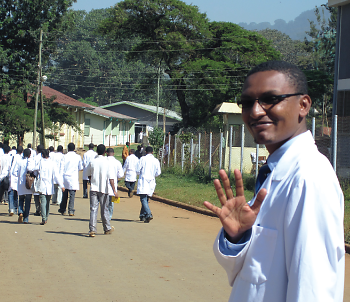In Ethiopia, where the population has endured decades of war and famine, it is common for people to eke out a subsistence living on less than $1 a day.
It is also a country in which mental health resources are scarce, especially in rural areas. There are only about 40 psychiatrists for a population of 80 million people, of whom 31 work in the capital, Addis Ababa.
Consequently, one of these psychiatrists—Markos Tesfaye, M.D., chair of psychiatry at Jimma University—wanted to establish a master’s of science program in clinical and community mental health to expand the mental health care work-force in the area around Jimma, which is rural and has some 5 million people, and in other areas of the country.
And with the help of psychiatrists and mental health professionals from Germany and the United States, he has managed to get the program off the ground.
Idea Arose During Residency
It all started in 2006 when Tesfaye was a final-year psychiatric resident at Ethiopia’s only psychiatric hospital—Amanuel Mental Specialized Hospital. On a typical day, a resident might have to see up to 40 outpatients or 40 emergency room patients in addition to caring for at least 10 to 15 acute inpatients. “During a meeting with our hospital director, I was thinking about how this problem might be solved,” Tesfaye told Psychiatric News. “I realized that many of the patients whom we saw really didn’t need to be seen by a specialist. I thought, since there aren’t enough psychiatrists, why not develop a program to train nonphysician clinicians who can help us?”
A few months later, Tesfaye met Gregory Fricchione, M.D., a professor of psychiatry at Harvard Medical School, who had come to teach psychiatric residents at Amanuel Mental Specialized Hospital for a month. Tesfaye shared his idea of developing a program to train nonphysician mental health professionals with Fricchione, who liked the idea and encouraged Tesfaye to pursue it.
In February 2008, Tesfaye sent a draft of the program he envisioned to Fricchione, who returned it with comments and asked Zeina Chemali, M.D., an assistant professor of psychiatry at Harvard Medical School, whether she would help develop a curriculum for the program. The next summer, she went to Ethiopia to do so. “Dr. Chemali’s visit provided a critical impetus in pushing the program forward,” Tesfaye said.
German Physicians Also Helped
Meanwhile, Tesfaye had also been communicating ideas about his proposed program with Matthias Siebeck, M.D., a professor at Ludwig-Maximil ians University in Munich, Germany, since Siebeck was the coordinator of a collaboration between Jimma University and Ludwig-Maximilians University. “Although a surgeon by profession, Siebeck had great compassion for individuals with mental illness and supported my idea from the outset,” Tesfaye said.
Siebeck then discussed Tesfaye’s program concept with psychiatrists at Ludwig-Maximilians University. In november 2008, Norbert Mueller, M.D., a professor of psychiatry at the university, visited Tesfaye, who was now affiliated with Jimma University. “During the visit, he contributed to the evolving curriculum and assured the commitment of his department to the program,” Tesfaye said.
The following spring, Zerihun Tadesse, M.D., M.P.H., the former head of the Disease Prevention and Control Program at the Federal Ministry of Health in Ethiopia, organized a meeting of key stakeholders to discuss the program. Psychiatrists at Amanuel Mental Specialized Hospital and at Addis Ababa University reviewed the program’s curriculum and gave it their approval.
Program Now in Second Year
Officials at Jimma University finally got the program under way in January 2010, with support from Addis Ababa University Department of Psychiatry, Ludwig-Maximilians University Department of Psychiatry, and a neuropsychiatry group at Brigham and Women’s Hospital in Boston.
The two-year program prepares students to receive a master’s of science degree in community mental health integrated with clinical psychiatric care. After graduation, they will be able to take a patient’s psychiatric history; diagnose and manage not only common psychiatric conditions, but also some common medical diseases in patients with mental illness; refer patients to specialized services when needed; educate and counsel patients and their families; consult effectively with other health professionals; keep accurate written medical records; and undertake community-based mental health research.
The program has 16 students to date. The first group will graduate in January 2012. The program has been copied at the University of Gondar, also in Ethiopia, and Tesfaye has managed to get scholarship funding so that some people from the neighboring African country of Somaliland can participate in it as well.
“In my opinion, the program is very valuable because it helps implement basic psychiatric care in regions where until now nearly no care exists,” Mueller told Psychiatric News.
“At this point, I think, Markos should be very proud of the program,” Chemali said during an interview. “Seeing it develop from a tiny drop to a contagious movement has really been a joyful experience.”
Hurdles Had to Be Overcome
Not surprisingly, a number of hurdles had to be overcome to get the program up and running. “Most challenging were the cultural and economic differences we had to bridge and the differing conceptions of psychiatric disorders in Europe and Africa,” Mueller noted.
And not surprisingly, several hurdles still have to be overcome to make the program a success. The biggest challenge, Tesfaye said, is finding psychiatrists willing to teach the courses. For example, he said he placed advertisements on the World Psychiatric Association Web site, but to no avail. “You have to keep in mind that this is rural Africa,” said Chemali. “So when you ask psychiatrists from developed countries to teach in the program, they may have no electricity, and water only every three days. When I first landed in Jimma in a small plane, we landed in a cornfield, not even on a runway.”
However, one other Ethiopian psychiatrist has decided to help Tesfaye teach program courses. “And as I get more psychiatrists to help, I would like to increase the number of trainees taken into the program each year in order to expand mental health resources in Ethiopia,” Tesfaye said.
“And if the program could accomplish only one thing,” he concluded, “I would like it to be that every district hospital in Ethiopia has a psychiatric clinic with a few acute inpatient beds run by a graduate from the program.”



